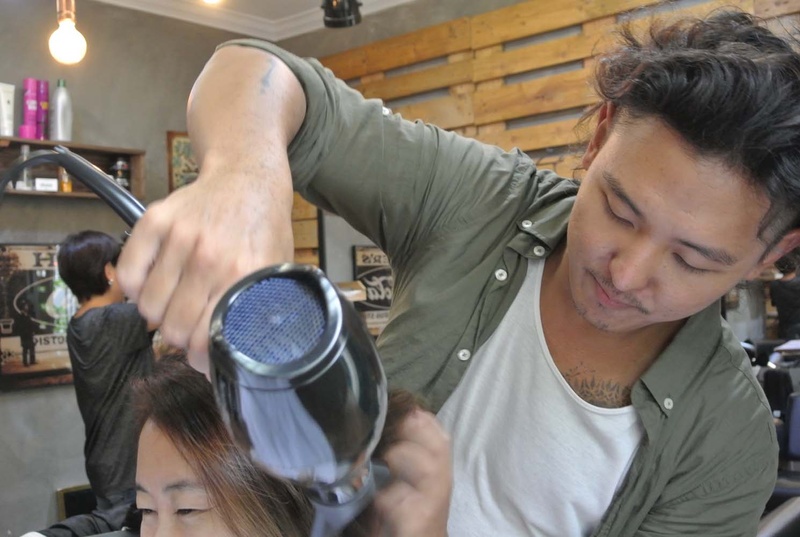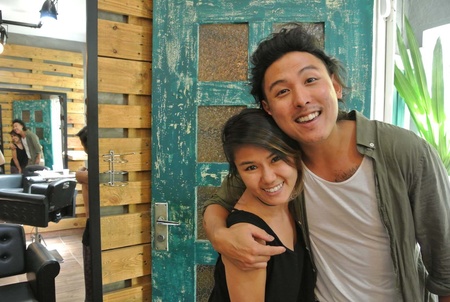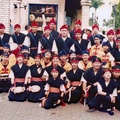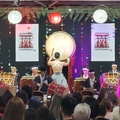Born in Brazil, Victor Keith Miamura is a yonsei and, at the age of two, he went to live in Japan with his parents, in the late 1980s. He grew up in Aichi, in the city of Toyokawa.
“At that time I had to have appendix surgery. Then, to pay for the surgery, they borrowed money and then, to pay off the debt, they decided to go to Japan”, he says.
Japanese or Brazilian?
In Japan, Keith says he didn't really know he was Brazilian and asked his mother if his first name was really Victor. Furthermore, he didn't have this issue of identity very clear in his head due to the contact he had with Brazilian culture. “At the time, there was only TV. Then when you see something from Brazil you see more black people or blondes, it's never Asian. So you think: 'Wow, Brazilian? I looked in the mirror and the biggest Japanese face was here!'”.
Despite this, at school, few knew that his first name is Victor. And in the Japanese registry the surname and name remained, Miamura Keiichi, a little different from the original spelling, which is in English.
“When I was about eight years old, I came here for a walk once.” And he thought he would be the only Japanese person in Brazil, “because – like it or not – I didn’t know it was like that”. But, as he passed in front of a school that is traditionally attended by Brazilian Nikkei , he was in for a surprise. “'How Japanese!' Then I started to change a little, but I had a very different image of Brazil. It was all new, right?”
The second time was when he was 14, when Keith says he started to understand better. “I came back here with my parents and then I looked at the passport. I think it was something more like that. But I didn't have much of an idea myself, like 'ah, I'm Brazilian', I didn't feel much when I was younger, it was only after I grew up a little that I started to feel more”, he says.
On this second trip to Brazil, the mother decided that they would return. “When my mother said she was going to come back here, I didn’t embrace that idea at all.” Until he finished the 8th grade and said goodbye to Japan (where education is until the 9th grade), Keith confesses that he was sad, but when he arrived he felt calmer.
And Miamura comments on what changed after realizing his true nationality. “It became more conscious that 'I think I'm really Brazilian', I started to understand more. But the relationship with no one hasn’t changed anything”, he concludes.
Return to Brazil
“Actually, my parents came back because of me too. There I had a little bit of trouble at school, until I got around to it a lot. That’s why my parents decided [laughs] to come back”, reveals Keith.
Back in Japan, his parents worked all day and he stayed at daycare – “usually these kids who stay at daycare are the ones who get ready”. He even stopped at the police twice, because he took “some things from some stores”. The second time he was caught, his mother decided that they should return to Brazil. “Nowadays I kind of regret it, but I think it’s a learning experience,” he says.
The decision gained more weight for another reason. Miamura's paternal grandfather was sick and especially his father already intended to return.
Portuguese
In the group of Nikkei friends, only one or the other knows how to speak Japanese and even then they talk in Portuguese.
“It's just that it's easier for me to speak in Portuguese, you know? It's just that when you don't use it a lot, you kind of lose your touch. And as I've been here for a long time, nowadays I already think in Portuguese. And to translate from Japanese to Portuguese I think it’s very different.”
Furthermore, he spoke more Portuguese at home also because of his brother, 12 years younger, who was only three years old when he came to Brazil.
Prejudice at school
When he had just arrived in Japan, Keith did not know how to speak Portuguese. “But then I started learning Japanese, but I couldn’t identify the two languages and separate them.” That’s why he spoke “batchanês” (a reference to bachan , which in Brazil mixes the two languages in speech). “So I said: 'get the chauan ', but then no one understood”.
“It was more of a joke and it was just one season too. Then I think it went smoothly afterwards”, he says. “I never suffered much prejudice because of this, because I am Brazilian.”
However, Miamura says that other Brazilians who entered the school, who had more of an accent or foreign appearance, suffered more prejudice. Americans and Europeans were not discriminated against.
Arubaito in Japan
With the idea of saving money to buy a car, Keith decided to go to work in Japan. His father was already there and made this proposal, which included a “good” salary.
So, he spent a little over a year there working in the factory. “As I already knew Japanese perfectly and they thought I spoke Portuguese well, they made me the leader of the section where there was Brazilian”.
Hair salon and adaptation in Brazil
Keith even took a professional hairdressing course in Japanese for about a year. It was from then on that he began to adapt better to life in Brazil and feel more comfortable interacting with people.
“I started leaving the neighborhood more, making more friends with the people here... My bachan practiced Seicho-No-Ie, so I started going and making more friends too, and it started to flow more”, he reveals.
Thus, there were two addresses with the old name of Jidai in the Vila Clementino region, in São Paulo, where the current salon, now called Keizen, is also located.
In the beginning, the father took care of the administrative side. After he went to Japan, his mother started to help him.
Currently, Keith runs the salon with his girlfriend. There, the majority of the public they receive is Nikkei , which represents 80 to 90%, because the loyal clientele was formed through recommendations from friends of Japanese descent. Despite this, non-descendants are also welcome to hear the stories of a yonsei who is sometimes more Brazilian and sometimes more Japanese.
© 2018 Tatiana Maebuchi







